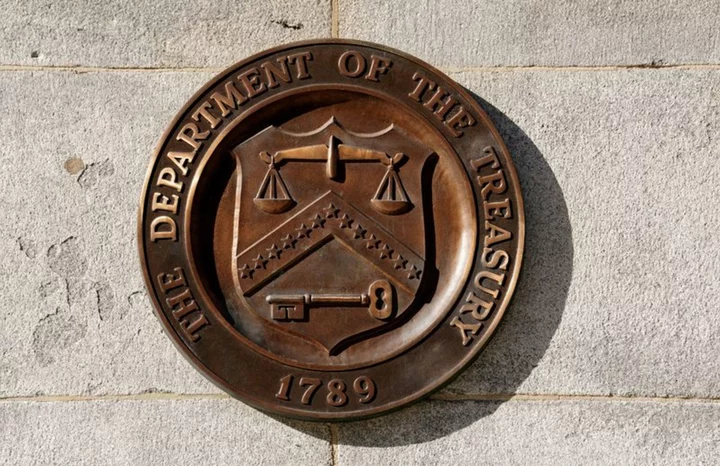The U.S. Treasury on Monday said the federal budget deficit in October shrank by nearly a quarter from a year earlier, as revenues climbed to a record for the month thanks to delayed tax payments from disaster-stricken areas that helped offset fast-rising interest costs.
The Treasury Department said the deficit for the first month of fiscal 2024 fell by 24% to $67 billion versus $88 billion a year earlier. It was the smallest October deficit since 2017. Economists polled by Reuters had estimated the deficit would come in at $65 billion.
The report was released on the heels of ratings agency Moody's announcement on Friday that it had lowered its outlook on the U.S. credit rating to "negative" from "stable," citing large fiscal deficits and a decline in debt affordability.
It also followed data last month showing the deficit in fiscal 2023, which ended Sept. 30, was the largest outside the COVID-19 era at nearly $1.7 trillion.
The U.S. government faces a potential shutdown later this week if Congress fails to pass a so-called continuing resolution by Nov. 17 to keep federal government operations fully funded to avoid some parts of the government shutting down.
Federal revenues in October rose 27% to a record $403 billion, substantially due to tax payments rolling in from California and other states that had annual tax filing deadlines extended due to natural disasters. That largely accounted for the 70% increase in non-withholding taxes from individuals and a 170% increase in corporate tax receipts.
Outlays, meanwhile, rose 16% to $470 billion, with a $41 billion year-over-year increase in interest payments on the U.S. government's debt accounting for about two-thirds of the net increase of $64 billion. Interest costs have surged since March 2022 when the Federal Reserve kicked off an aggressive campaign to rein in inflation, resulting in the U.S. central bank's benchmark overnight interest rate shooting up by 5.25 percentage points.
With the average interest rate on the $26 trillion of outstanding Treasury securities up to 3.05% from 2.19% in October of last year, that trajectory is unlikely to change in the foreseeable future, Treasury officials said.
Interest on the debt, at $89 billion, was the second largest outlay in October after monthly Social Security payments of $118 billion. A year ago, interest on the debt was exceeded by Social Security, national defense spending and the combined total of the government-run Medicaid and Medicare health insurance programs.
(Reporting by Dan Burns; Editing by Paul Simao)









